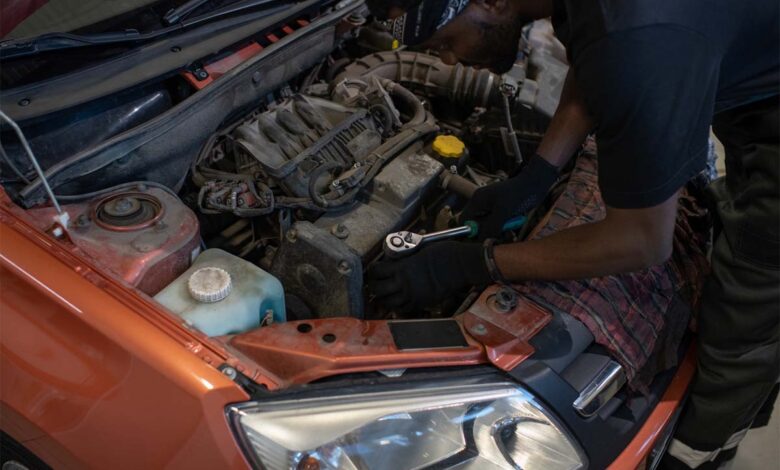New automobile service centre to boost skills, employability

NIGERIA
Olalekan Abdulraheem can finally beat his chest and say that he is well on course to becoming a skilled mechanical engineer who can run his own workshop or work for a reputable automobile company when he graduates in two years’ time.
A fourth-year student at the faculty of engineering and technology, University of Ilorin (Unilorin) in Nigeria, Abdulraheem had endured three years of learning that was heavy on theory and low on hands-on experience, creating a gap in the skill sets required to transform him into the auto-mechanic of his dreams.
The gap began to narrow rapidly in February 2024 when his faculty announced the opening of FETUILS Car Service Centre, a one-stop shop for vehicle diagnosis and maintenance at Unilorin that also serves as a learning centre for students and locals from host communities.
“The workshop has been bridging the wide gap that used to exist between students’ theoretical and practical knowledge of automobile engineering. Whenever a concept taught in the classroom is not clear to us, we can quickly go there and ask the technicians on the ground,” Abdulraheem told University World News.
Until the centre was established, Abdulraheem had limited access to practical sessions, occasionally visiting automobile workshops outside the campus to pick up one or two skills.
“The centre has now given me unfettered access to learn the nitty-gritty of automobile repair and maintenance, and I plan to set up my own workshop after completing my studies,” he said.
Excellent learning experience
As with Abdulraheem, several students shared their experiences of how the centre is helping them to build capacity and garner experience that will have them in good stead in the labour market.
For Benedict Akinwale, a second-year mechanical engineering student, it has been a great learning experience so far. Within three months, he has learned to fix brakes and shock absorbers, and he can service car engines under limited supervision. He expects to be well grounded in automobile maintenance by the time he completes his five-year course of study.
“The centre has exposed me to what is being taught in the classroom. It reinforces the theories we learn and helps us to demonstrate them. Many of us will have learned the required skills to set up our own centres after leaving the school, so we will not have to search for jobs in the already distressed labour market,” Akinwale said.
Employability crisis in Nigeria
Unemployment, especially among young people, is a global crisis. The number of unemployed youths was estimated at 73 million globally in 2022, according to the International Labour Organization.
In Nigeria, the youth unemployment rate increased from 7.8% to 8.6% in the third quarter of 2023, the National Bureau of Statistics reported. Central to the crisis is a lack of requisite skills that render many graduates unemployable.
A study on employability skills among undergraduates at Unilorin revealed that the employability level of the sampled students was average. The article recommended that “the university management should, as a matter of urgency, create a graduate employability programme that includes such employability techniques as interview skills, job searching skills, entrepreneurial skills, and self-development skills”. It was published in the Canadian Journal of Family and Youth in January 2022.
In their research titled, ‘Managing University Education for Employability in Nigeria: The way forward’, published in the British Journal of Education, Dr Anthony Ossai and Dr Ezinwa Okokoyo of the faculty of education at the University of Delta in Agbor, observed that poor funding and infrastructural shortages in Nigerian higher education institutions are major factors preventing students from acquiring the necessary skills.
To scale up the employability skills graduates need, the researchers called for regular curriculum revision; adequate educational facilities such as gadgets, laboratories and workshops; regular accreditation of universities to sustain high standards; and the involvement of labour employers in the development, design and delivery of courses.
Centre to create income, employability
Mustapha Ndagi, an assistant chief technologist at Unilorin’s faculty of engineering and technology, told University World News the centre was established as part of the institution’s drive to raise more employable graduates, provide services that will be beneficial to the university community and the general public, and assist the university to augment dwindling government funding.
“It is more than a car servicing centre. When you have a workshop where students can be immersed in learning skills, where they can practise, of course you expect them to become employers of labour and not depend on what the government can do for them. That is the essence of setting up a centre like this.
“Also, in recent times, the government has been saying it can no longer fund universities, so we have to find a way to generate funds. This [centre] is one of the ways we can generate revenues internally, even though it is small for now.
“The workshop is open every day except Sunday. We did a week of free diagnostic service for all the university staff who have vehicles. And, afterwards, they have been bringing their vehicles for maintenance for a fee. We have also been getting customers from outside the university,” Ndagi said.
Widespread interest in workshops
A resident auto technician who manages the centre, Olanrewaju Lamina, said the workshop currently trains 100 students divided into different groups, with about 15 students participating in each practical session. Lamina said the response has been very encouraging, as students from other faculties are showing interest, too.
He said: “We have enough vehicles on the ground to practise with. Within a short time of establishment, we already have students who can fix basic automobile problems. I am very sure that, within a year, we should have students who can handle such basic mechanical problems without supervision. Some students from other faculties, like education and public administration, have also enrolled in the workshop.
“We are equally looking at how the university’s neighbouring communities can benefit from the centre, and we are extending the room for apprenticeship to them. We are fine-tuning the enrolment process and, before the end of this year, we will start receiving apprentices who have to pay small fees.”
Reflecting on the employability crisis, Lamina said the establishment of the centre was inspired by persistent complaints that many graduates lack skills and are not employable.
“When we looked into the system, we found that it was a problem with the curriculum. There was too much theory and not enough time for practice. We thought of having our own centre to run hand-in-hand with the classroom. We are trying to build it into the curriculum in such a way that it [automobile maintenance training] will be mandatory for all the mechanical engineering students to enhance their practical knowledge of the automobile system,” he said.
Host communities, private sector commend initiative
Saka Dauda, a youth leader in Ile-Apa, one of the university’s host communities, said many locals are looking forward to enrolling in the automobile centre.
“Even those who are informally trained as automobile mechanics want to go to the centre to benefit from experts’ training. It is a welcome development, and we hope that it will go a long way in empowering young people,” he added.
Private-sector players equally applauded the initiative of the centre, saying it promises to bring out the potential in students and locals.
Dr Muda Yusuf, the chief executive officer at the Centre for the Promotion of Private Enterprise, believes that students trained at the workshop will be highly sought after in the labour market, will perform better, and will provide good supervision to their subordinates.
“We should also have something similar in other fields. We have to take internships seriously. The only discipline that is very serious about it is medicine, where students are attached to hospitals for hands-on experience.
“That is why we don’t really have employability problems with medical doctors and nurses. Practice has been deeply incorporated into the training. This is the kind of thing we should see in all fields so that we can reduce the challenge of graduate employability,” he told University World News.



